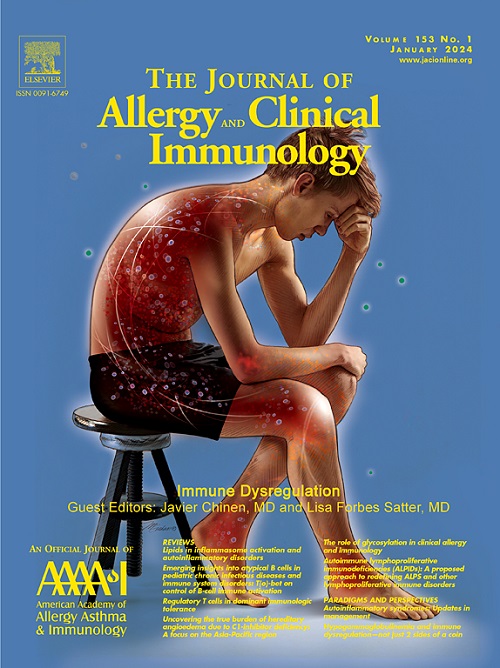22q11.2缺失综合征和精神病患者的自身抗体。
IF 11.2
1区 医学
Q1 ALLERGY
引用次数: 0
摘要
22q11.2缺失综合征的发生率约为1:2000。它是世界上最常见的染色体疾病之一。它在成年期精神病发作的频率为25%,使其成为精神病最常见的病因。精神病的发病机制尚不清楚,然而,有数据支持炎症的作用。考虑到22q11.2缺失综合征患者免疫系统的改变,本研究检测了与精神病相关的自身抗体。目的:我们检验的基本假设是精神病患者的免疫景观是否与非精神病患者不同。在这项研究中,我们检测了自身抗体是否在精神病患者中出现增加。方法采用UT西南自身抗体阵列检测患者和对照组的自身抗体水平。分析采用双尾学生t检验,并对错误发现率进行Benjamini-Hochberg校正。结果总体而言,儿童和成人患者的自身抗体水平均低于对照组。而成年精神病患者的自身抗体明显高于无精神病的成年患者。10名精神病患者中有8名ssDNA自身抗体比对照组高出2个标准差以上。这并不伴有明显的临床自身免疫。结论22q11.2缺失综合征合并精神病患者与携带该缺失但未发生精神病的患者具有不同的免疫学特征。总体而言,精神病患者的自身抗体水平明显较高。这一发现可能在22q11.2缺失综合征人群中定义一个高风险群体。本文章由计算机程序翻译,如有差异,请以英文原文为准。

Autoantibodies in patients with 22q11.2 deletion syndrome and psychosis
Background
The 22q11.2 deletion syndrome occurs in roughly 1 in 2000 live births. It is one of the most common chromosomal conditions worldwide. It has a frequency of psychosis in adulthood of 25%, making it the most common known etiology for psychosis. The mechanisms of disease for psychosis are poorly understood; however, there are data supporting a role for inflammation. Given the altered immune system in 22q11.2 deletion syndrome, this study examined autoantibodies associated with psychosis.
Objective
The underlying hypothesis that we tested was whether patients with psychosis have an immune landscape different from that of patients without psychosis. In this study, we tested whether increased autoantibody levels were seen in patients with psychosis.
Methods
We utilized the University of Texas Southwestern autoantibody array to measure levels of autoantibodies in patients and controls. The analyses were performed using a 2-tailed Student t test with Benjamini-Hochberg correction for false discovery rate.
Results
In general, both child and adult patients had lower levels of autoantibodies than the controls. The adult patients with psychosis, however, had significantly higher autoantibody levels than the adult patients without psychosis. Of the 10 patients with psychosis, 8 had levels of autoantibodies to single-stranded DNA that were more than 2 SDs higher than in the controls. This was not accompanied by clear clinical autoimmunity.
Conclusion
Patients with 22q11.2 deletion syndrome and psychosis appear to have immunologic characteristics different from those of patients who carry the deletion but do not have psychosis. Overall, autoantibody levels were significantly higher in patients with psychosis. This finding may define a high-risk group within the population with 22q11.2 deletion syndrome.
求助全文
通过发布文献求助,成功后即可免费获取论文全文。
去求助
来源期刊
CiteScore
25.90
自引率
7.70%
发文量
1302
审稿时长
38 days
期刊介绍:
The Journal of Allergy and Clinical Immunology is a prestigious publication that features groundbreaking research in the fields of Allergy, Asthma, and Immunology. This influential journal publishes high-impact research papers that explore various topics, including asthma, food allergy, allergic rhinitis, atopic dermatitis, primary immune deficiencies, occupational and environmental allergy, and other allergic and immunologic diseases. The articles not only report on clinical trials and mechanistic studies but also provide insights into novel therapies, underlying mechanisms, and important discoveries that contribute to our understanding of these diseases. By sharing this valuable information, the journal aims to enhance the diagnosis and management of patients in the future.

 求助内容:
求助内容: 应助结果提醒方式:
应助结果提醒方式:


